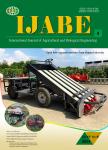Comparative proteomics analysis of tea leaves exposed to subzero temperature:Molecular mechanism of freeze injury
比较蛋白质组学分析暴露在零下温度的茶叶:冻害的分子机制作者机构:Institute of Agricultural EngineeringJiangsu UniversityZhenjiang 212013JiangsuChina Institute of Life SciencesJiangsu UniversityZhenjiang 212013JiangsuChina
出 版 物:《International Journal of Agricultural and Biological Engineering》 (国际农业与生物工程学报(英文))
年 卷 期:2013年第6卷第4期
页 面:27-34页
核心收录:
学科分类:0202[经济学-应用经济学] 02[经济学] 020205[经济学-产业经济学]
基 金:the National High Technology Research and Development Program of China(2012AA10A508) the National Natural Science Foundation of China and Jiangsu Province(31101089/BK2010326) Jiangsu Agriculture Science and Technology Innovation Fund(CX(12)3025)
主 题:freeze injury molecular mechanism freeze protection comparative proteomics Camellia Sinensis mass spectrometry
摘 要:Tea freeze injury is one of the most severe agro-meteorological disasters,which leads to sizable losses of tea production in *** freezing resistant ability of overwintering tea trees becomes weaker and weaker from early-spring to *** it decreases to critical temperature of-2℃or lower in the stage with one or two leaves,tea trees suffer from freeze injury and the yield or quality of spring tea production could decrease *** measurements have been taken to prevent such damage,the physiological and biochemical mechanism of how tea(Camellia Sinensis)plant response to freeze injury is still to be elucidated.A comparative proteomics analysis was made on tea leaves at the two-leaf *** differential image analysis showed 46 spots with density changes(29 spots increased and 17 spots decreased;p0.01)in the freeze injury group compared with the control *** eight differential protein spots(p0.01)with good resolution and relatively high abundance in MS were subjected to further protein *** them,all 17 up-regulated spots were collected whereas only six of the down-regulated spots were *** differentially expressed proteins including heat shock protein 70,oxygen-evolving enhancer protein,adenosine triphosphate synthase,S-adenosylmethionine synthetase and some enzymes involved in carbohydrate metabolism,were shown responsive to freeze *** results would greatly increase the comprehension of the molecular mechanism for freeze injury and provide a better decision making for freeze protection and control.



